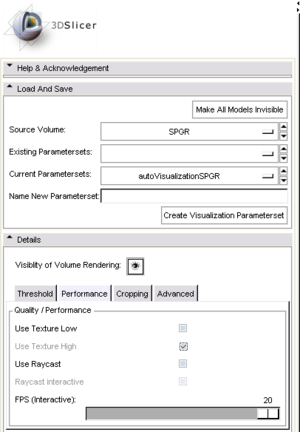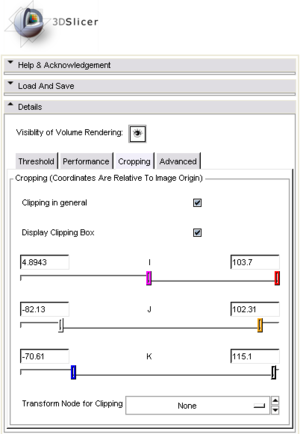Slicer Training Volume Rendering
Back to 3D_Ultrasound_Module_in_Slicer_3
Contents
Volume Rendering
Get It Running
- To get volume rendering to work within 3D Slicer we have to make sure that a MRML node with Volumetric Data exists.
- If not a new set of volume data must be loaded. For this demo we will load the tutorial data found here.
- Download and Uncompress this folder
- In 3D Slicer go to File -> Load Scene
- Select the tutorial.xml
- Now select the VolumeRendering Module.
- Select a valid volume as the Source Volume
The Volume Rendering will be initialized. Have patience....
Parameters
Performance Triggers
You can adjust the performance of volume rendering by enabling and disabling quality improvements. The Volume Rendering Module has three performance levels
- Low Resolution Hardware Rendering (worst - fastest)
- Full Resolution Hardware Rendering
- Software Rendering (best - slowest)
When all of them are selected slicer uses the low resolution when the camera is moving or nodes in the scene are changing and when nothing is changing anymore the high resolution volume is performed.
The FPS tag lets slicer decide what resolution should be used to produce an interactive experience.
Cropping
With cropping the volume can be limited to a certain area. This is useful if a surgeon only wants to see a certain part of the volume or cut at an exact plane.
This feature also comes with a integrated 3 dimensional widget to adjust the handlers on the visualization screen.
Try it out!
Advanced Options and the Transfer Function
The advanced tab lets more experienced doctors do the fine tuning on the Transfer Functions.
Transfer Functions are the basic building block of volume rendering. They define the final rendering color for each voxel in the 3D grey scale data. This can be used to give all tissue with the density of bone a solid white color and paint the skin tissue in a translucent pink above it.
More Information
- Slicer3 Volume Rendering Module: Slicer3:Volume_Rendering
- Slicer3 Volume Rendering Module using CUDA: Slicer3:Volume Rendering With Cuda



